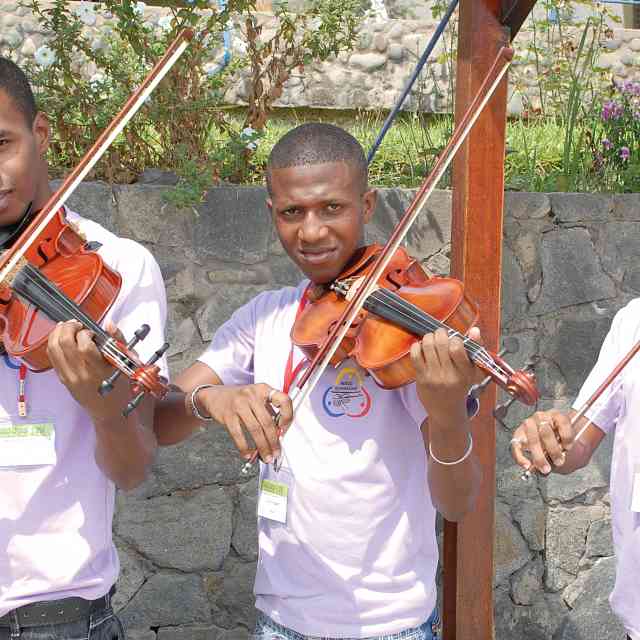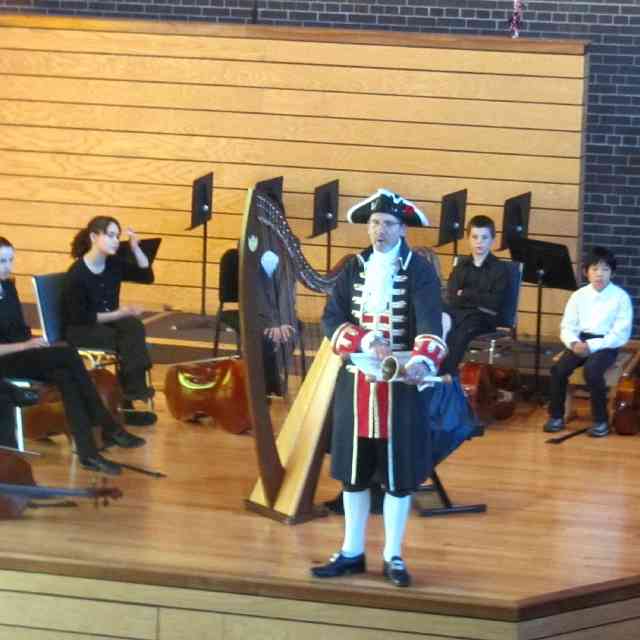“Mentoring is a brain to pick, an ear to listen and a push in the right direction.”
—John Crosby
What We Did
The UWSP Suzuki Strings Mentoring Program (SSMP) was launched September 11–12, 2010. The three brave mentees arrived on the UWSP campus from Lincoln, NE, Watertown, WI, and Monument, CO. One teaches for a community music school, one at a small private college and one teaches out of her home. Though the SSMP accepts teachers of any string instrument, these three teachers were all violinists. Two scholarships were awarded to help with technology and travel costs.
The weekend began with the Suzuki Association of the America’s (SAA) Suzuki Principles in Action course which included six additional teachers from the community. At the conclusion of the course, the three mentees met for an additional three hours to get to know one another better and discuss and practice the technology portion of the SSMP (i.e. learning how to record video with a computer and upload videos to a server and using D2L, a course management program).
Over the first ten months of the course, the class read three books, viewed three videos of Dr. Suzuki’s teaching at ASI in 1976, and participated in online discussions about the topics via D2L. In addition, each mentee submitted four or five videos of their teaching followed by a sixty- to ninety-minute Skype conference with the mentor. Goals for improvement were established at the end of each call. In March, Skype video conferencing became available and we scheduled video conferences five or six times for the four of us, about once every six weeks. Topics for these conferences were generated by the mentees.
The last Skype group conference was August 26, 2011. Each mentee made a ten- to fifteen-minute culminating presentation about what they have learned from participating in the SSMP and how it has affected their teaching.
Benefits from the Mentor’s Perspective
All three of the mentees were very open to learning and to developing a support group among themselves. They developed a good relationship while together on that first weekend and were eager to share ideas and learn from one another. In all three cases, the teachers felt overwhelmed or less confident for about the first eight months of the program before beginning to feel settled and in a teaching rhythm again.
What can be said as of now is that all three of these teachers have grown in their understanding and practice of teaching skills and have become leaders among their colleagues. All three have shared the hope that they would still continue to upload videos for the purpose of getting feedback from each other.
From the Mentees
“This is what the UWSP-SSMP has ultimately meant to me this year. Without mentorship I would not have had the opportunity to receive guidance, tear down wrong ideas (get out that sledgehammer), and start rebuilding from the foundation up. As an experienced teacher, there are not many open forums where one can voice one’s insecurities and frustrations and where one can receive instruction free from fear of professional repercussions. Due to this open door of communication, I also truly learned from the life experiences and frank sharing of my colleagues in the course. Being able to interact with the most current research in conjunction with practical application made those resources live where I lived.
The SSMP has provided all of this for me, but surprisingly, instead of feeling torn down and rebuilt—made over—I feel more like I have discovered a secret garden of growth, learning and joy.” –BP
“… each of you brought aspects to our discussions that have been so enriching… BP, your thoughtful and artistic angle (I still remember being wowed by your illustration of “tone” during the SPA course); JB, your enthusiasm, and the way in which some of your words on the D2L discussion were on fire with motivation, and the “I get it” moments with follow-ons as to ideas you want to apply to your own teaching. Not to mention the offer to bring chocolate brownies to our Skype conference last spring! And Pat, your expertise and openness to sharing your ideas, thoughts and feedback. Wow. But beyond the conference calls and Skype conferences, beyond the posting we all added to with the readings, we were all thinking/muddling/pondering in the days in between. There is inspiration in that—we are all muddling together at times. We have connected as life-long colleagues, and the dedication, passion and commitment of each of you to teaching effectively is inspiring and will continue to inspire me for a long time!
… Probably the best thing out of this year is having great questions to ponder—to then live in the inquiry for the rest of my time as an educator… especially given there are different “answers” for different children… and the answers may change over time for the same child. This idea of living in the inquiry has never been a comfort zone for me. But the past year I am beginning to embrace this as the means through which my own creativity as a teacher and my knowledge background can be incorporated into the most effective teaching for my students.” –TP
“The biggest idea that I have come away with from this year’s mentorship is that we need to keep justifying and refining our teaching methods. Nothing is ever fixed, it can only be developed. We can’t fix a bow hold, or a bad attitude, or even a mother/child relationship. We can only develop it and try to push it in the right direction. It’s hard to explain how this year has changed my teaching. I believe that this mentorship has changed my teaching so much that I don’t even realize how much I have changed.
… I have really seen a transformation with my students this past year, and I’m certain it has to do with the mentorship. There are very few lessons that I dread, because my students are very aware of what I expect and work very hard. I had the best retention rate over the summer that I’ve ever had. My studio is full and I now have a waiting list. It’s because of this mentorship that my students are sticking around and are blossoming into fantastic players. –JB
The Class of 2011-12
Applications for the class of 2011–12 were accepted until July 1, 2011. Three applications were accepted, and all three are violinists. Two are veteran teachers with private studios and the third has about three years’ experience and is beginning a new studio. The Class of 2012 met with seventeen other teachers in Fort Worth, Texas, on September 24–25 for the Suzuki Principles in Action course and for SSMP technology training. They have read and discussed books such as Intelligent Music Teaching by Robert Duke and The Talent Code by Daniel Coyle, and now they are delving into the stages of child development and how the characteristics of each stage impact our teaching.
The class of 2010–11 and the class of 2011–12 plan to meet at the SAA Conference in Minneapolis in May.









